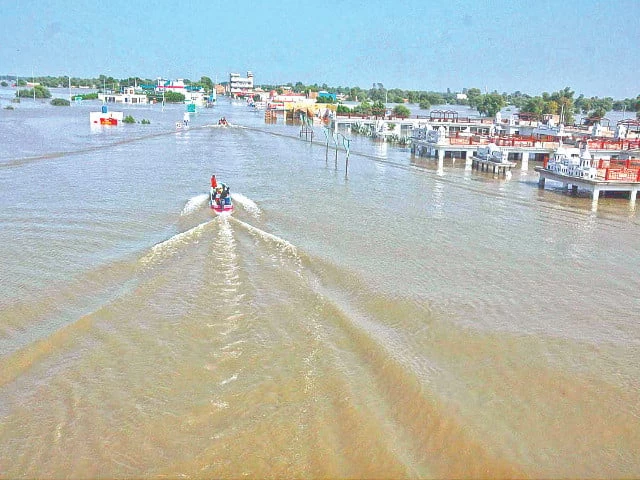Islamabad:
The International Monetary Fund (IMF) does not foresee any major setback to Pakistan’s financial growth or revenue collection this financial year due to the recent floods. Apart from Punjab, provinces have also not reported significant financial losses, minimizing the chances of a downward revision in goal.
According to government sources, Pakistani authorities have assessed flood -related losses in three rivers, but the evaluation of destroyed or damaged infrastructure in Punjab is still underway.
Sources of government said an IMF delegation shared its views on the financial effects of the floods during a kick-off meeting with Finance Minister Muhammad Aurangzeb. Governments in Balochistan, Sindh and Khyber-Pakhtunkhwa (KP) shared their original assessments of flood loss with the IMF team during separate meetings.
The sources said the IMF team during the kick-off meeting observed that based on initial input there was no significant financial loss. However, the IMF said it would wait for the report on injury assessment, the sources added.
The global lender then also no influence on the floods of tax revenue. It emphasized that the Federal Board of Revenue (FBR) should share the visible result of the transformation plan. Prime Minister Shehbaz Sharif had approved the transformation plan last year to revive the tax machinery and also gave over RS55 billion for various initiatives according to the plan.
The IMF’s observations about the effect of the floods came on the heel of the Prime Minister’s request to the IMF Managing Director to factor in the effects of the floods during the review meetings. The IMF was assessed that the government could meet the flood -related expenses from the emergency pool and that it may not need additional resources, the sources said.
Pakistan-IMF review interviews began on September 25, which will be planned to continue until October 8. The successful culmination of these lectures would pave the way for the release of two tranches, a total of over $ 1.2 billion under two different loan programs.
The sources also said Pakistan’s internal assessment was that there would be no major impact on the floods on economic growth. The government has set a growth target of 4.2%and it still expects to achieve from 3.7%to 4%, the sources added.
The total financial losses are estimated by the Planning Commission to around RS360 billion or 0.3% of the size of the economy. The Commission’s assessment was that GDP growth can still remain around 4%.
One of the reasons not to estimate large losses on the crops was that sowing rice and sugar cane took place more than the area originally estimated. This would offset the effect of loss of the crops, they added.
Nor would the deficit for ongoing account rise beyond the estimated figure as no further need for imports is being projected due to flooding, the sources added. The Pakistani authorities also do not see any major increase in imports. However, the IMF has not yet shared its projection of economic growth, import and deficits on the current accounts.
The sources said the IMF delegation raised the question of the delay in the publication of the report on management and corruption diagnosis. Authorities assured the global lender that the government would release the report this week.
The report points out several deficiencies in Pakistan’s judicial, administrative and corporate structure, which contributed to poor governance in any important field of life. The IMF has also handed over a dozen recommendations to ensure the rule of law and the integrity of the judiciary.
During his meetings with three provinces, the IMF pointed out low health and education expenses in the last financial year. The KP government said that low health expenses were due to the fact that many positions by doctors could not be completed because of the slow employment process.
The IMF asked if the provinces would be able to meet the extra costs of the flood -related rehabilitation. The sources said the provincial governments did not indicate the need for additional resources due to limited influence.
However, the position of the Punjab government will be important in this regard, which plans to provide a comprehensive rehabilitation package to the affected people. The province is the worst affected by the floods and its encounter with the IMF will take place this week.
The governments of KP and Sindh shared their original assessments. According to the authorities, Sindh estimated that the financial losses can remain in the RS40 billion interval. To RS50 billion The KP government told the IMF that losses can be in the RS30 billion area.
FBR remains the weakest link in the chain. The tax authorities are struggling to reach this quarter RS3.083 trillion targets. They needed over $ 500 billion. RS on September 30 (today) – the end of the first quarter of the current financial year – to reach the target.
The filing of the tax return is also around 3.2 million compared to the total return of 7.7 million, which has been lodged for the tax year 2024. FBR has also expanded the date of import duty and tax -free sugar by two months to November. Previously, it had notified that the sugar can be imported tax -free until 30 September.
The FBR also awarded an additional two-month extension to dealers in real-time electronic transmission of VAT tax revenue to FBR’s computers. It was the second extension that means accepting the impracticality of the previous deadlines.



